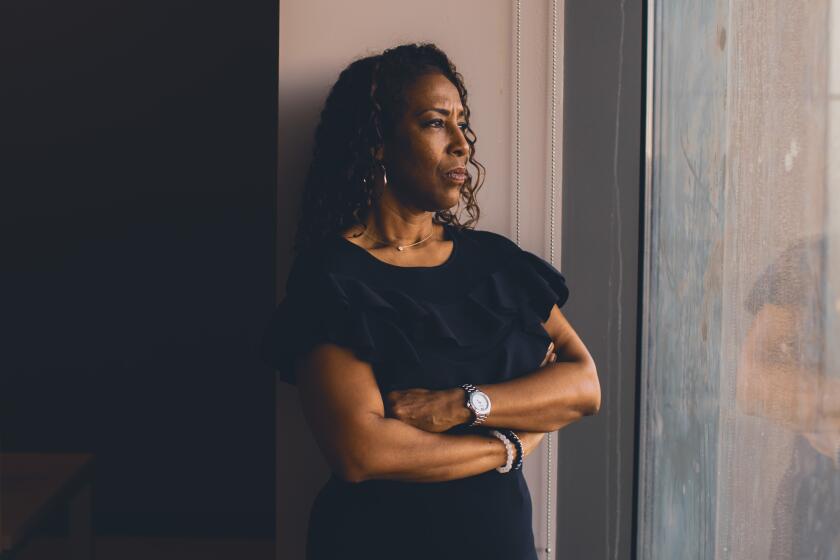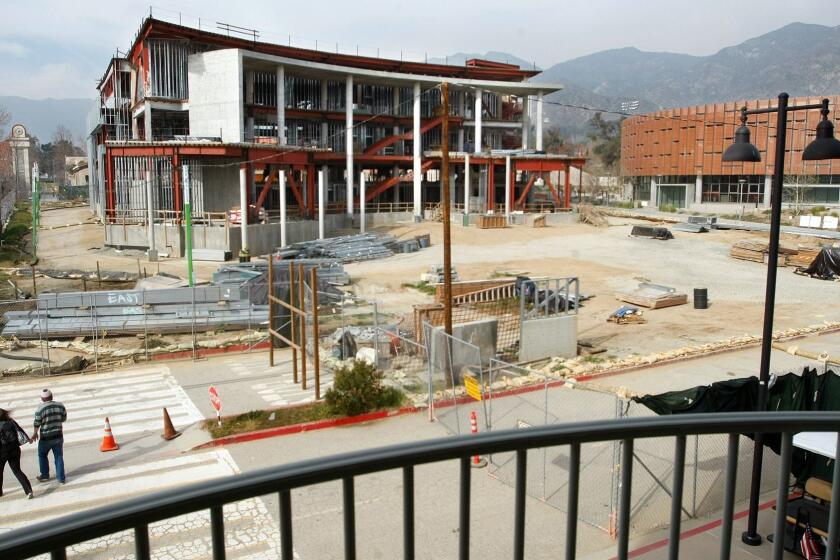L.A. community college district chancellor to step down amid faculty tensions, lawsuits

Los Angeles Community College District Chancellor Francisco Rodriguez, who has led the nation’s largest two-year higher education system for the last decade, will step down in the fall, according to an email sent to top administrators, a move that comes amid faculty tensions, legal allegations of gender discrimination and other challenges.
Rodriguez told his cabinet on Monday he would resign Nov. 2 to help his aging father with his “health challenges” and spend more time with his family. The announcement shocked many district members because the Board of Trustees had granted him a four-year contract last November.
“It has been my extreme honor and privilege to work with you, and I will forever be grateful for your confidence and your collegiality,” Rodriguez said in an email to his cabinet, obtained by The Times. “I am very proud of the work that we have performed together on behalf of the very talented and inspiring students we serve.”
Rodriguez did not immediately respond to questions from The Times. The district will send a formal announcement to the LACCD community after trustees meet Wednesday to finalize plans, a spokeswoman said.
He is credited by supporters with bringing in more state funding to the district, hiring more than 900 full-time, tenure-track faculty members, promoting initiatives for academic success for students of color, especially Black and Latino men, and bolstering racial and gender diversity among faculty and staff. He also has focused on workforce training for students.
But Rodriguez, 61, has also faced fierce opposition to his leadership of the district’s nine colleges and more than 170,000 students.
The LACCD Academic Senate, representing more than 4,000 faculty members, approved a vote of no confidence against Rodriguez and the Board of Trustees in May for what it said was a failure to adequately address multiple allegations of sexual harassment and investigate concerns about the use of public funds in contracting and procurement practices. The vote was approved 29 to 0 with one abstention.
Sabrena Turner-Odom wanted to give back to her alma mater. Instead, she’s in a contentious lawsuit, alleging a top administrator at the community college sexually harassed her.
In one high-profile case, a Los Angeles jury ordered the district in fall 2022 to pay $10 million in damages to a Southwest College professor who accused a high-ranking administrator of sexual misconduct. The jury found the district was negligent in hiring Howard Irvin, a former vice president of student services at Los Angeles Southwest College, and had retaliated against the plaintiff, Sabrena Turner-Odom, for making the complaint.
The district appealed the verdict. But it faces at least three other ongoing lawsuits involving Irvin, who was fired from the district during a closed session board meeting in December 2022.
Other women have also filed lawsuits against the district, alleging gender discrimination, whistleblower retaliation and other offenses. They include Maribel Medina, who was fired as general counsel after complaining she was subject to pay disparities and other bias by a chancellor who told her that “Mexican women serve me and like it,” according to her lawsuit filed in January.
The district on Monday did not respond to questions about Medina’s suit and firing. In its March court filing, the district denied Medina’s allegations.
In a statement after the no-confidence vote, Angela C. Echeverri, president of the LACCD Academic Senate, said: “For months, the Board of Trustees and Chancellor Rodriguez have circumvented calls for transparency, sidestepped meaningful reforms, and failed to adequately address concerns about sexual harassment, retaliation, and the use of public funds, particularly in the case of large public contracts. ... We can no longer afford to tolerate a culture of silence, indifference, and inaction.”
Last winter, the Academic Senate called on the Board of Trustees to improve efforts to prevent sexual harassment and discrimination by conducting timely and impartial investigations, and taking disciplinary actions if violations are found. The resolution also called on the board to “regularly review its policies and procedures regarding sexual harassment and discrimination to ensure their effectiveness and compliance.”
The district said at the time that it had implemented improvements in how it processes sexual harassment complaints based on recommendations from a 2018 task force. “LACCD remains unequivocally committed to a zero-tolerance policy for sexual harassment of any kind in our classrooms and workplace, and to fostering a campus climate that promotes respect and civility,” the statement said.
Faculty leaders and other reformers are also urging the district to bring in independent auditors or a blue-ribbon external committee to examine the district’s handling of its procurement practices and $15-billion construction bond program.
Nearly two years ago, David Salazar arrived at the Los Angeles Community College District, ready to oversee a massive $3.3-billion construction bond program that voters had approved for the largest two-year college system in the nation.
The district has long been enmeshed in controversy over its handling of its bond program. In 2018, the district’s chief facilities director began raising red flags about what he said were cost overruns, sloppy management, fierce backroom politics and entrenched relationships between board trustees and construction interests in its voter-approved construction bond program. He was fired the next year.
The college district said in a 2018 statement that it is a “staunch custodian of taxpayer money” and that “all complaints are treated with the utmost seriousness and are thoroughly reviewed. Any claims that are substantiated will be pursued accordingly.”
Faculty leaders and other district officials also cited concerns with the district’s handling of another 2022 case involving allegations that a college employee attempted to steer a contract for goods and services to his sons. The district’s internal audit department dismissed the complaint against the official, whom it identified only as “Employee A,” after finding a “substantial lack of evidence” to support, according to the review.
But Medina, then general counsel, asked an external law firm to investigate the case again. The firm, according to its report, found that the “overwhelming weight of evidence” supported the allegations — and named the official in question as Irvin, then at Los Angeles Trade-Technical College.
“Anytime anyone files a whistleblower complaint, it goes nowhere,” Echeverri said in an interview.
Echeverri said Rodriguez’s personable manner and connections helped the district obtain additional funding, and he allocated $2 million to promote racial equity in educational outcomes. But she said he had a “terrible track record” in gender equity.
Rodriguez, a San Francisco native, graduated from UC Davis with a bachelor’s degree in Chicano studies and a master’s degree in community development. He received his doctorate in education from Oregon State University. Before joining LACCD, he headed the MiraCosta Community College District in Oceanside and Cosumnes River College in Sacramento.
More to Read
Sign up for Essential California
The most important California stories and recommendations in your inbox every morning.
You may occasionally receive promotional content from the Los Angeles Times.













